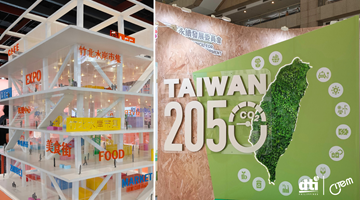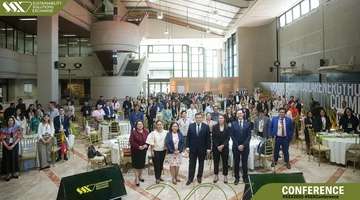POSTED Mar 29, 2022 - 01:03 PM
Sustainability Is More Than Just About The Environment
Terms like sustainable, green, and eco-friendly are often thrown around and used as synonyms, but there’s more to these terms than just caring for the environment
Sustainability is often defined as our ability to meet our own needs while ensuring that future generations will still be able to meet and provide for their own. International organizations such as the United Nations have come up with strategies, processes, and pathways that lead to sustainability as an end goal. This is called “sustainable development,” which has become a common, global goal since it was first reported by the Brundtland Commission under the United Nations in 1987.
The three pillars of sustainability
When we think of sustainability, we immediately associate it with the environment and the need to repair, restore, and care for it. This may be because the desire to meet our needs comes with the need to use and consume resources and often, resources are connected to nature or the environment. Media, public relations, and marketing also play a role in this misconception, as most choose (knowingly or not) to only highlight the environmental aspect of sustainability.
However, true and complete sustainability encompasses more than just nature. There are three pillars to consider: the environment, society, and economy.
Environmental sustainability
This gets the most focus in the media and movements towards sustainability. To achieve environmental sustainability means that there is a balance in the Earth’s systems. It also means that the Earth’s existing resources are consumed at the same rate that they can be replenished.
With the current news on climate change and pollution, one thing is clear: We are consuming faster and more than we are capable of restoring or regenerating. This is why there is also a growing clamor for a shift to a circular economy.
Social sustainability
Humans are the most populous creatures on the planet, making us both a valuable resource and an important factor on the Earth’s road to achieving balance. To achieve sustainability, it’s also important to pay attention to the people who inhabit it. The goal of social sustainability is to ensure that universal human rights are upheld and that basic human needs are attainable by all.
Ensuring that people have access to resources and keep them secure and healthy are just as essential in achieving social sustainability. Paying fair wages, ensuring work-life balance, gender and racial equality, diversity and inclusivity are also signs of this.
As such, leadership and government play a role. Just leaders who can uphold their respective society’s rights and can ensure universal human well-being are key.
Economic sustainability
While sometimes the road to sustainability is often portrayed as a fight against consumption, that is actually not the case. The stability of economic systems is also key in overall sustainability. This pillar is met if communities have access to resources and have secure sources of livelihood available to all.
Circular economy
The origins of the concept of a circular economy emerged as early as the 1960s and 1970s, according to a paper by Paul Ekins et al of the University College London Institute for Sustainable Resources. In the same paper, Ekins writes that the concept was first “fully defined and described in economic terms” in the Pearce and Turner 1990 environmental and resource economics textbook.
The Ellen MacArthur Foundation defines a circular economy as a system that “gives us the tools to tackle climate change and biodiversity loss together, while addressing important social needs. It gives us the power to grow prosperity, jobs, and resilience while cutting greenhouse gas emissions, waste, and pollution.”
Meanwhile, the Solar Impulse Foundation, a group that organizes guides to create clean and profitable solutions, defines a circular economy as an economic model that aims to produce goods and services in a sustainable way by limiting consumption and waste of resources such as raw materials, water, and energy, and by limiting waste production.
In that sense, a circular economy can be said to fit into the larger framework of sustainability. The action of a circular economy also has a focus on corporations, companies, and governments, while sustainability encompasses all.
Green, eco-friendly, environmentally friendly
Because environmental sustainability is often at the forefront of the movement, a number of sustainability buzzwords have also come up such as “green.” It is used as an adjective and attached to actions and objects to give the impression that the product or activity is beneficial for the environment.
“Eco-friendly” and “environmentally friendly” are also similar in this regard. Eco-friendly usually refers to something that is beneficial to the environment. Environmentally friendly on the other hand means something is not harmful for the environment. It’s important to be specific with the terms being used to avoid greenwashing products and services.
Before marking products as sustainable, green, or eco-friendly, there should be clear evidence and proof to back up each “green” claim.
Knowing exactly what the terms and concepts we’re using and dealing with is a step towards better understanding how we can make truly sustainable solutions.
For more information and news on home, furniture, lifestyle, and fashion accessories visit FAME+
For more information and news on food, food businesses, restaurants, local food brands, food lifestyle, and entrepreneurship, visit IFEXCONNECT and FOODPHILIPPINES
Read more

Rooted in Advocacy, Crafted for the Future
Going strong for 42 years, Manila FAME is a bold, seasoned trade show shaped by decades and transfor... Learn More

Learning the curve of sustainability: CITEM explores Taiwan’s SDG-driven industries
CITEM tracks sustainable practices in Taiwan’s transformative industries, and gets a glimpse of a... Learn More

CITEM Market Sensing Mission to Taiwan to strengthen PH SDG competency
Making serious strides toward strengthening the country’s sustainability footprint, CITEM travels to... Learn More

EU, PH push for green solutions in food industry at Sustainability Solutions Exchange 2025
Aiming to develop a sustainable Philippine food industry, the European Union (EU) and the Department... Learn More
